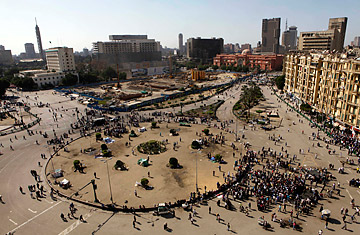
Cairo's Tahrir Square, the focal point of the Egyptian uprising, on April 10, 2011, a day after protesters barricaded themselves inside the square demanding the resignation of the military leadership's head
(2 of 2)
For some, the weekend's clashes proved that the protesters have continued to take the battle too far, pushing the army — an ally that helped topple Mubarak — to the point of confrontation, and potentially derailing the path to reform. They argue that now is not the time to confront the military, however imperfect it may be; it's a time to rebuild a battered economy and prepare for a new political system. "They are destroying the country," said one bystander in disgust on Sunday, as a few hundred young people continued to chant.
For others, however, the violence — unleashed suddenly on the protesters who had camped out from Friday afternoon's demonstration — confirms their worst fear: the army is not on the side of the revolution after all. "Why did all of this happen?" cries Nadi Ayat, an outraged government bureaucrat. "In the dark of the night, they attacked innocent people. Why? Because they're asking for democracy?"
For el-Abedy, it's so much more complicated than that. It's about striking the right balance. "I agree with the protesters," he said on Sunday, glancing at the small crowds, then at the garbage and rock piles in the same spot where he stood boldly two months before. "But to try to break down the city and the square again, it's not O.K."
Stepping into a café on the edge of Tahrir Square, where he used to take tour groups, el-Abedy sits down with a cup of coffee. "Protesters can't be protesters all the time. We need time to drink the Nescafé," he says, gesturing to his glass. "You have to stop to think, to see, to evaluate. And then you can start again." In his free time without tourists, the international-affairs graduate is forming a political party. He's participating in discussions about policy at the nearby journalists' union. That's not to say he's against the occasional Friday protest. The military needs pressure every now and then to keep it on the right track, he says. "The message is: We can gather the Egyptian people again. We are ready. We are aware," he says. But by 9 p.m., it's time to go home; it's best to let life in the square go on. And, "It's not wise to clash with Tantawi."
As he speaks, a lively debate outside — over the details of Saturday morning's violence — turns into a shoving match and spills into the café, toppling tables and smashing tea glasses before the café owners force it back out. "Better to stay out of Tahrir," el-Abedy laughs.
On Sunday, however, Mubarak himself seemed to provide the revolutionaries with encouragement. For the first time since he was toppled, the ex-President spoke to the Egyptian people, via a prerecorded speech broadcast by the al-Arabiya satellite channel. "I can't remain silent toward the campaigns of falsehood, slander and defamation and the continuous attempts to ruin my and my family's reputation and integrity," he said. Allegations that he and his family used their positions in power to amass wealth and properties were false, he added. Many Egyptians said they found the speech to be insulting.
Shortly afterward, the country's Attorney General formally summoned Mubarak and his family before the court. It was a victory for many of those who protested Friday, and even for those who remain in Tahrir. On Monday, small groups of protesters continued to chant against the military even as others saw that the military had been sufficiently persuaded to keep up the good work. "I think if, every Friday, we take one more step in the right direction of the revolution, that will be good. We have to be patient," says el-Abedy. "We still have some trust in the army that they are from us, and we are from them."
